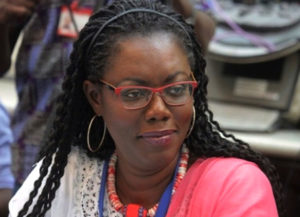Ghana to switch-over to Digital Terrestrial Television next year – Minister

Mrs. Ursula Owusu-Ekuful, the Minister of Communications, has said the National Digital Terrestrial Television (DTT) Project switch-over would commence in the first quarter of next year.
She said the Ministry had completed the provision of dedicated power to 37 DTT transmission sites in eight regions, namely Eastern, Central, Western, Volta, Northern, Brong Ahafo, Upper East and Upper West.
She said a team of NEDCO engineers and the suppliers, NET Limited, were currently provisioning the dedicated electricity power into the transmitters to ensure the availability of digital broadcasting signals in the northern part of the country.
Mrs Owusu-Ekuful, announced this at the Meet-the-Press series in Accra when the Communications Ministry took its turn.
“All other sites have dedicated power and testing is ongoing and the switchover is scheduled to commence in the first quarter of next year,” she said
Government is implementing the road map to migrate the country from analogue to digital television transmission.
The ‘As-Built’ DTT platform has two multiplexes with a full capacity of 40 Standard Definition (SD) channels.
This capacity has been fully exhausted by existing analogue broadcasters, and that, new broadcasters had been authorised by the National Communications Authority (NCA) to operate.
According to the Minister, there were pending applications for digital terrestrial television broadcasting authorisations in existing regions and the new regions to be created, which would also require localized channels on the platform.
She said adequate capacity has to be provided to accommodate broadcasters that had secured premium content rights (i.e. pay-per-view events) and wanted to transmit through the platform.
Additionally, international broadcast companies such as France24, CNN, and others had also expressed interest in localizing their content on the DTT platform when capacity is available, she said.
In recognition of those challenges, the Minister stated that, an audit of the DTT infrastructure was conducted and expansion of the infrastructure to include disaster recovery sites and additional 60 channels with a mix of High Definition and Standard Definition Channels was recommended.
Meanwhile, the Communication Minister would next week, co-chair the European Union-Africa Union (EU-AU) Digital Economy Task Force with Mr. Pierre Guislan, Vice President of the African Development Bank.
The invitation to Ghana to co-chair the programme was in recognition of the Government’s digital agenda to drive economic growth.
She mentioned some programmes being implemented by the government as the National Identification Project, Digital Property Address System, Paperless Port Operations, Mobile Money Interoperability and Digital Financial Services and digitization of revenue collection and land administration.
The Minister said those programmes were some of the deliberate steps being undertaken to strengthen the foundations of the Ghanaian economy and formalise it.
Vice President Dr. Mahamadu Bawumia has been leading the Government’s team to explore the full potential of modern technological tools and systems for the benefit of the country.
“The government’s digitisation agenda is driven by the need to quickly modernise our processes, technology and the right skills for our people to drive economic growth,” Mrs Owusu-Ekuful, said.
She assured of government’s commitment to continue working to help the public and private sector scale up the uptake of technology at all levels to leapfrog the country’s development.
The Minister said the formalisation of the economy was going on rapidly through the use of technology and would utilise it in revenue generation, collection and accountability, saying; “There is an indelible link between ICT and economic development”.
Source: GNA
